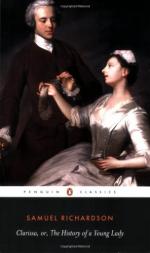What, therefore, I am thinking of, is this—’Suppose Mr. Hickman, whose good character has gained him every body’s respect, should put himself in my uncle Harlowe’s way? And (as if from your knowledge of the state of things between Mr. Lovelace and me) assure him not only of the above particulars, but that I am under no obligations that shall hinder me from taking his directions?’
I submit the whole to your consideration, whether to pursue it at all, or in what manner. But if it be pursued, and if my uncle refuses to interest himself in my favour upon Mr. Hickman’s application as from you, (for so, for obvious reasons, it must be put,) I can then have no hope; and my next step, in the mind I am in, shall be to throw myself into the protection of the ladies of his family.
It were an impiety to adopt the following lines, because it would be throwing upon the decrees of Providence a fault too much my own. But often do I revolve them, for the sake of the general similitude which they bear to my unhappy, yet undersigned error.
To you, great
gods! I make my last appeal:
Or clear my virtue,
or my crimes reveal.
If wand’ring
in the maze of life I run,
And backward tread
the steps I sought to shun,
Impute my error
to your own decree:
My feet are
guilty: but my heart is free.
[The Lady dates again on Monday, to let Miss Howe
know, that Mr.
Lovelace, on observing her uneasiness,
had introduced to her Mr.
Mennell, Mrs. Fretchville’s
kinsman, who managed all her affairs. She
calls him a young officer of sense
and politeness, who gave her an
account of the house and furniture,
to the same effect that Mr.
Lovelace had done before;* as also
of the melancholy way Mrs.
Fretchville is in.
* See Letter IV. of this volume.
She tells Miss Howe how extremely urgent Mr. Lovelace
was with the
gentleman, to get his spouse (as
he now always calls her before
company) a sight of the house:
and that Mr. Mennell undertook that
very afternoon to show her all of
it, except the apartment Mrs.
Fretchville should be in when she
went. But that she chose not to
take another step till she knew
how she approved of her scheme to have
her uncle sounded, and with what
success, if tried, it would be
attended.
Mr. Lovelace, in his humourous way, gives his friend
an account of the
Lady’s peevishness and dejection,
on receiving a letter with her
clothes. He regrets that he
has lost her confidence; which he
attributes to his bringing her into
the company of his four
companions. Yet he thinks
he must excuse them, and censure her for
over-niceness; for that he never
saw men behave better, at least not
them.
Mentioning his introducing Mr. Mennell to her,]
Now, Jack, says he, was it not very kind of Mr. Mennell [Captain Mennell I sometimes called him; for among the military there is no such officer, thou knowest, as a lieutenant, or an ensign—was it not very kind in him] to come along with me so readily as he did, to satisfy my beloved about the vapourish lady and the house?




